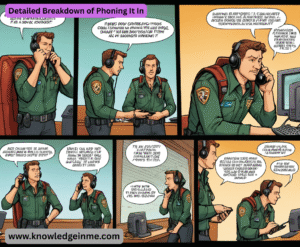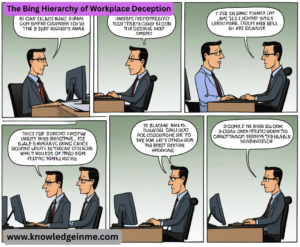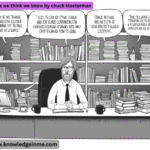Phoning it in by stanly bing “Phoning It In” is a book by Stanley Bing, a pseudonym for Gil Schwartz, a longtime executive at CBS and a columnist for Fortune magazine. The book, published in 2010, is a humorous yet insightful take on corporate culture, workplace dynamics, and the art of appearing productive while doing as little as possible.
Key Themes & Takeaways:
- “Phoning It In” Defined: The phrase refers to doing the bare minimum to get by—appearing engaged while mentally or physically checked out. Bing explores how this happens in corporate environments where employees (and even executives) Phoning it in by stanly bing master the illusion of work.
- Corporate Satire: Bing skewers office politics, management fads, and the absurdities of modern business life. His writing is witty and filled with sharp observations about how people navigate (or avoid) real work.
- Survival Strategies: The book offers “tactics” for employees to maintain appearances—how to look busy in meetings, craft vague but impressive emails, and delegate effectively (i.e., dump work on others).
- Executive Insights: As an insider, Bing provides a cynical but realistic view of leadership, highlighting how some executives thrive by mastering perception rather than actual productivity.
- Work-Life Balance (or Avoidance): The book touches on how people balance (or fail to balance) work demands with personal life, often opting for the path of least resistance.
Style & Tone:
- Humor & Irony: Bing’s writing is satirical, making it an entertaining read for anyone who’s endured corporate life.
- Anecdotal: Filled with fictionalized (but relatable) workplace scenarios.
- Cynical but Truthful: While exaggerated, the book reflects real workplace behaviors.
Who Should Read It?
- Office workers who’ve ever felt disillusioned with corporate culture.
- Managers who want to understand (or combat) employee disengagement.
- Fans of workplace humor (similar to Dilbert but with a corporate executive’s perspective).
Legacy:
- While comedic, it also serves as a critique of bureaucratic inefficiency and the performative aspects of modern work.
Detailed Breakdown of Phoning It In
The Art of “Phoning It In
- “Bing defines “phoning it in” as a survival skill in the modern workplace: doing just enough to avoid scrutiny while conserving energy for what actually matters (or for nothing at all). He breaks it into tiers:
- Amateur Hour: Obvious slacking (e.g., long lunches, excessive “doctor’s appointments”).
- Pro Level: Crafting the illusion of productivity (e.g., strategic CC’ing on emails, jargon-heavy memos).
- Executive Mastery: Delegating everything while taking credit (the “visionary leader” approach).
Key Chapters & Concepts
- While the book is humorous, it’s structured like a mock-guide to corporate warfare. Notable sections include:
- “The Meeting Is the Work”: How to dominate (or disappear in) meetings without contributing.
- “Managing Upward”: Flattering bosses so they leave you alone.
- “The Magic of Delegation”: Turning your workload into someone else’s emergency.
- “E-Mail as a Weapon”: Using vague subject lines (“Per our conversation…”) to imply activity.
- “The Zen of Looking Busy”: Desk feng shui (open tabs, a furrowed brow, carrying a stack of papers).
Corporate Culture Satire
Bing lampoons:
- Performance Theater: Employees who “act” busy (e.g., sighing loudly while staring at Excel).
- Buzzword Bingo: Empty phrases like “synergy” or “circle back” that signal faux competence.
- The Cult of Overwork: Pretending to work late while secretly online shopping.
Darker Undertones
Beneath the humor, Bing critiques:
- Phoning it in by stanly bing The Pointlessness of Bureaucracy: Many jobs exist to sustain other jobs, not to produce value.
- The Illusion of Meritocracy: Promotion often rewards perception, not performance.
- Burnout Culture: The book’s humor masks a real frustration with meaningless work.
Stanley Bing’s Larger Body of Work
- Bing (Gil Schwartz) wrote extensively about corporate life. Key titles include:
- What Would Machiavelli Do? (2000): Ruthless business tactics framed as advice.
- The Big Bing (2006): A collection of his Fortune columns.
- Immortal Life (2011): A novel about a CEO chasing eternal youth.
Signature Style:
- Cynical yet Affectionate: Bing loves/hates corporate life, like a jaded insider who can’t quit.
- Fictionalized Truths: His stories are exaggerated but rooted in real executive behavior.
- The Every-Executive: He writes for the “little guy” stuck in middle management hell.
Reception & Legacy
- Praise: Lauded for its wit and relatability—The Wall Street Journal called it “a manual for corporate disillusionment.”
- Criticism: Some argue it normalizes slacking, but Bing’s point is deeper: the system incentivizes performative work.
- Relevance Today: With remote work and “quiet quitting,” Phoning It In feels prophetic.
If You Liked Phoning It In, Try…
- The Dilbert Principle (Scott Adams) – Comic strip satire of office life.
- Bullshit Jobs (David Graeber) – Anthropological take on meaningless work.
- Personal Best (George Anders) – Bing’s parody of self-help business books.
The Bing Hierarchy of Workplace Deception
Bing categorizes “phoning” into evolutionary stages:
- Neanderthal Slack: Obvious avoidance (e.g., “printer malfunctions”).
- Homo Corporateus: Weaponized incompetence (“I’d love to help, but IT hasn’t given me access!”).
- Executive Transcendence: The art of making others thank you for doing nothing (e.g., “Let’s form a committee to study this”).
Tactical Breakdown: Bing’s Greatest Hits
The Meeting Matrix
- Move 1: Speak early with vague optimism (“Big-picture, I love where this is going”).
- Move 2: Hijack jargon (“Let’s leverage our learnings to ideate a paradigm shift”).
- Escape Hatch: Fake an urgent call (“Sorry, the client needs me”).
Email Fu
- Phoning it in by stanly bing The CC Ambush: Copy higher-ups to imply gravity (“Per our chat, attaching draft for visibility”).
- The Vanishing Reply: “Thanks!” (No follow-up required).
Office Camouflage
- Desk Theater: Open Excel + a half-eaten salad = “Too busy to socialize.”
- Hallway Evasion: Walk briskly with a clipboard—no one stops a man on a mission.
The Dark Side: When Phoning It In Goes Wrong
Bing warns of pitfalls:
- The Overplay: Delegating so much you become redundant.
- The Ghosting: Disappearing until someone notices (RIP “quiet quitting”).
- The Karma Strike: When your own tricks are used against you.
STANLEY BING’S UNIVERSE: A READING GUIDE
Essential Bing (Ranked by Ruthlessness)
- What Would Machiavelli Do? (2000)
- Key Lesson: “It’s better to be feared than loved—but bonuses are best.”
- Signature Move: How to fire someone while making them apologize.
Sun Tzu Was a Sissy (2004)
- Chapter to Highlight: “Destroying Your Enemy’s WiFi = Modern Warfare.”
The Big Bing (2006)
- Best Column: “How to Sleep Your Way to the Middle” (literal napping strategies).
Bing’s Writing Style Decoded
- Voice: A cross between a war general and a bartender who’s heard it all.
Tropes:
- The “Wise Fool” CEO (brilliant or clueless? Unclear).
- The “Sacrificial Middle Manager” (promoted to take blame).
- The “Office Shaman” (that one employee who knows where the bodies are buried).






